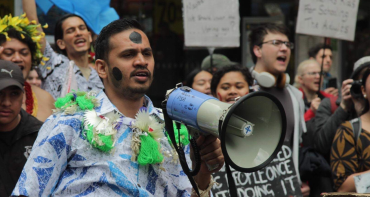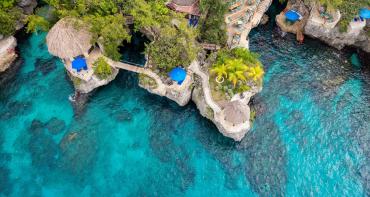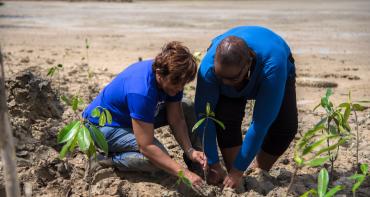Sea-level rise is causing irrevocable damage to communities, lives and livelihoods, but also provides some opportunities for growth.

This was the key outcome of an event organised, earlier this week, along the margins of COP29, by the Commonwealth Secretariat.
Attendees heard that climate finance for mitigation and adaptation is desperately needed, but the best solution is sustainable and long-term climate financing.
Dr Sivendra Michael, Chief Negotiator, Permanent Secretary, Ministry of Environment and Climate Change from the Government of Fiji, told delegates how geospatial data, which provided evidence in their climate finance applications, has helped the country enhance its disaster resilience. Fiji has a comprehensive five-year seawall financing strategy to not only guide the design of new walls, but to also help long-term financing plans.
He said:
“It has proven indispensable for building an evidence base and strengthening climate-adaptation rationale. Detail mapping efforts encompasses seawall sites and areas of interest, analysing the dynamics and in situ conditions of foreshore zones, mangrove nurseries and identifying environmental hazards as well as socioeconomic vulnerabilities of impacted communities,”
Fiji has already constructed six data-based seawalls and completed an engineering review of the existing data-based seawall design supported by the Asian Development Bank.
Dr Michael shared that with the support of the Commonwealth Climate Finance Access Hub, SPC – The Pacific Community, UNITAR and UNOSAT, as well as World Resources Institute, Fiji was able to secure US$5.7 million for their adaptation fund. Funding will directly enhance the resilience of approximately 2,466 residents across 14 villages, with SPC spearheading the project as implementing partner.
Fiji has now secured funding to set up a standalone geospatial team. This forward-looking and longer-term thinking - instead of project-based and limited funding cycle projects – is the ideal, said Mr Barnabas Bago, National Programme Coordinator, Ministry of Environment, Climate Change, Disaster Management from the Solomon Islands.

The Solomon Islands have taken an approach of free, user-friendly and open-source software for geospatial information technology. They use the data in analysing risks and to inform disaster management and enhance resilience. Yet, challenges remain mostly around sustainability and continuity of services to support geospatially informed decision-making because funding is generally project based.
Mr Onuoha Obeka, Director, Environment Protection & Control, Nigeria Delta Development Commission informed delegates that 40 million people of the Niger Delta have been affected by rising sea levels and the country’s coastal communities have lost large chunks of land. Like Fiji, Nigeria is also turning to UNITAR and UNOSAT for geospatial data. Director Obeka appealed for more partnerships and collaboration:
“We need to build seawalls, we need to build shoreline protections, we need to canalise our rivers, we need to do a whole lot of activities that can help reduce impacts of climate change in the Delta.
The funds of our agency are barely enough to fight these challenges. We are looking for an improved stream of income that can help us tackle some of these problems.”

Media contact
-
Suné Kitshoff Senior Communications Officer, Communications Division, Commonwealth Secretariat
- M: +44 7740 450 901 | E-mail



